Zoho CRM is a popular software that many businesses rely on to manage contacts, leads, and sales. It offers great AI features, plenty of automation tools, and a customizable interface to suit a range of operational needs.
However, Zoho CRM isn’t a one-size-fits-all solution and isn’t necessarily the best fit for every company. Some larger businesses may find some features limiting, while smaller teams may think the platform is too complex for straightforward use cases.
There are several suitable Zoho alternatives on the market, and we’ll go over some of the top options in this blog post. We’ll look at what makes software like monday CRM such a strong choice, and outline how you can migrate from Zoho CRM to a new platform.
Try monday CRMZoho CRM: An overview
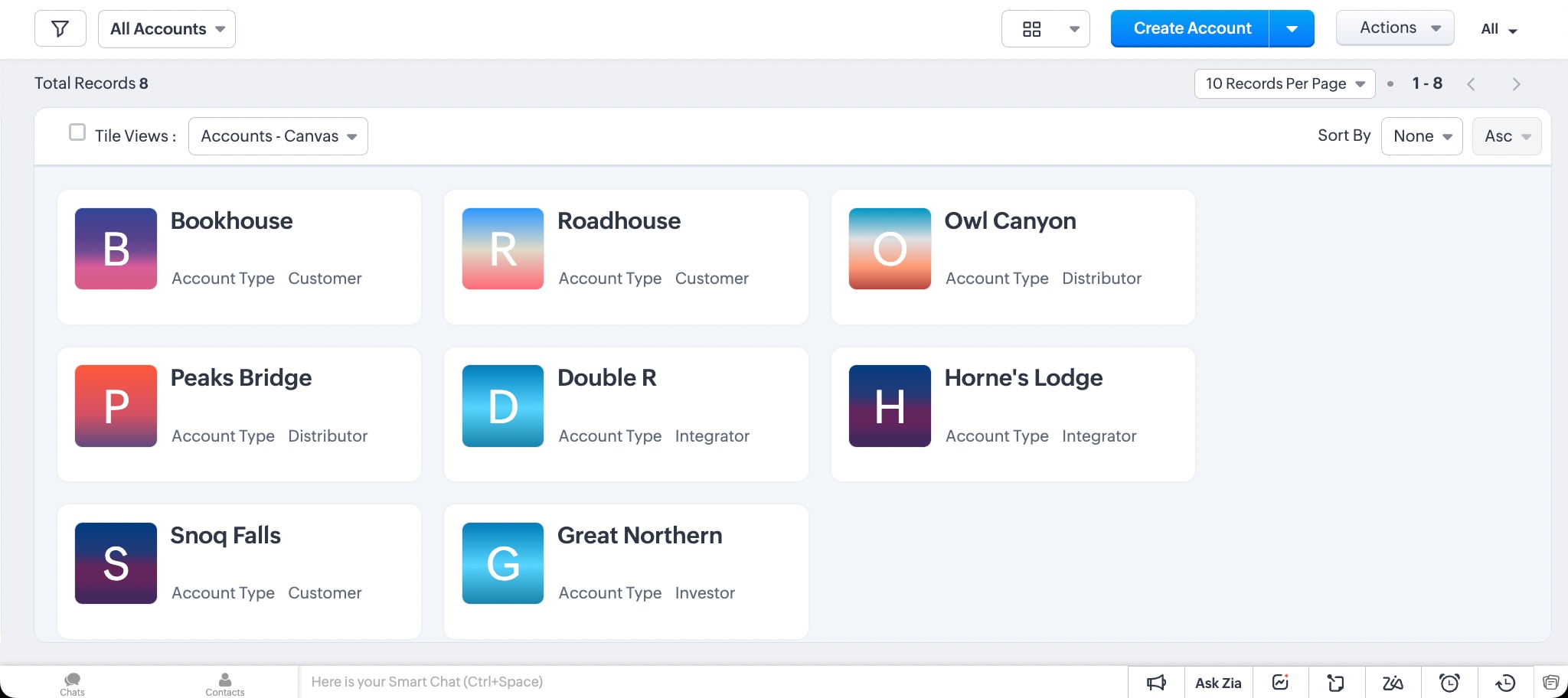
As a part of the Zoho ecosystem, Zoho CRM was built to help businesses grow through intuitive lead, contact, and sales management. The platform relies heavily on AI to help its users optimize workflows, automate manual tasks, and generate real-time 360-degree insights and custom reports. Teams can orchestrate the entire customer journey from start to finish from one platform, offering organizations a way to boost productivity while improving the user experience.
Some of the top features users get with Zoho CRM include an AI assistant, Zia, to help sales agents with forecasts, insights, and automated contact management. Users can also design processes and automate workflows in just a few clicks to speed up the pace of work. Additionally, the platform can be customized to fit different use cases and departments, making it easier for marketing and sales teams to work together.
Benefits and drawbacks of Zoho CRM
Zoho CRM offers some great features and customization options and a lot of teams have had success using it. However, some others had some experiences that left them looking for alternative options. Here’s a closer look at some of the pros and cons of Zoho CRM, including what some users have said about the platform on Zoho CRM’s G2 review page:
Pros
- Zoho CRM’s pricing model includes a free forever CRM platform, great for individuals or very small teams
- The interface is easy to use once you get the hang of it
- Zoho CRM platform acts as a one-stop-shop for businesses to handle contacts, leads, deals, and post-sales activities
- The analytics tools have helped users make stronger choices based on reliable data
Cons
- Users report a steep learning curve and long implementation time, which could lead to a longer period of adjustment and delayed ROI
- Some users report poor customer service experiences
- Advanced features and configurations can be tricky for users without technical skills
- Lead management processes don’t feel intuitive or efficient according to some users
What should you consider in a Zoho CRM alternative?
Picking the right CRM isn’t an easy choice. This is the software that’s going to help you close more deals and increase your company’s bottom line, after all. When shopping around, there are some core considerations to focus on to help steer you in the right direction.
- User-friendliness: It may seem obvious, but many CRMs can feel clunky and complicated when you need something easy to use but still capable of tackling any sales workflow, no matter how complex
- Integration with the apps you already use: Take stock of the sales tools and applications your team uses frequently and look for a CRM that offers seamless integrations with those apps
- Visual pipeline management: With a good CRM, you don’t only want to manage your sales pipeline, but you want to be able to see the deals in action to better assess status and next moves
- Budget and value: Of course, one of the key considerations should be your company’s budget, so look for a CRM that offers flexible pricing in addition to value in the features you’re getting with each plan
- Advanced AI tools: Most CRMs now are equipped with some form of AI, but you want to look for advanced AI CRM platforms that will help you work more efficiently, like AI assistants, generative AI content, sales forecasting tools, and sentiment analysis, among others
- User reviews: One of the best ways to make sure the CRM you’re considering is worth your time is to look at what real users have to say about it on software review sites like G2 or TrustRadius
Top 7 alternatives to Zoho CRM
We’ve gathered some of the top Zoho CRM alternatives on the market and compared them for you below. Based on their unique features, pricing details, and a look at how they stack up to Zoho CRM, you can make the best decision on the CRM that’s right for your organization.
1. monday CRM
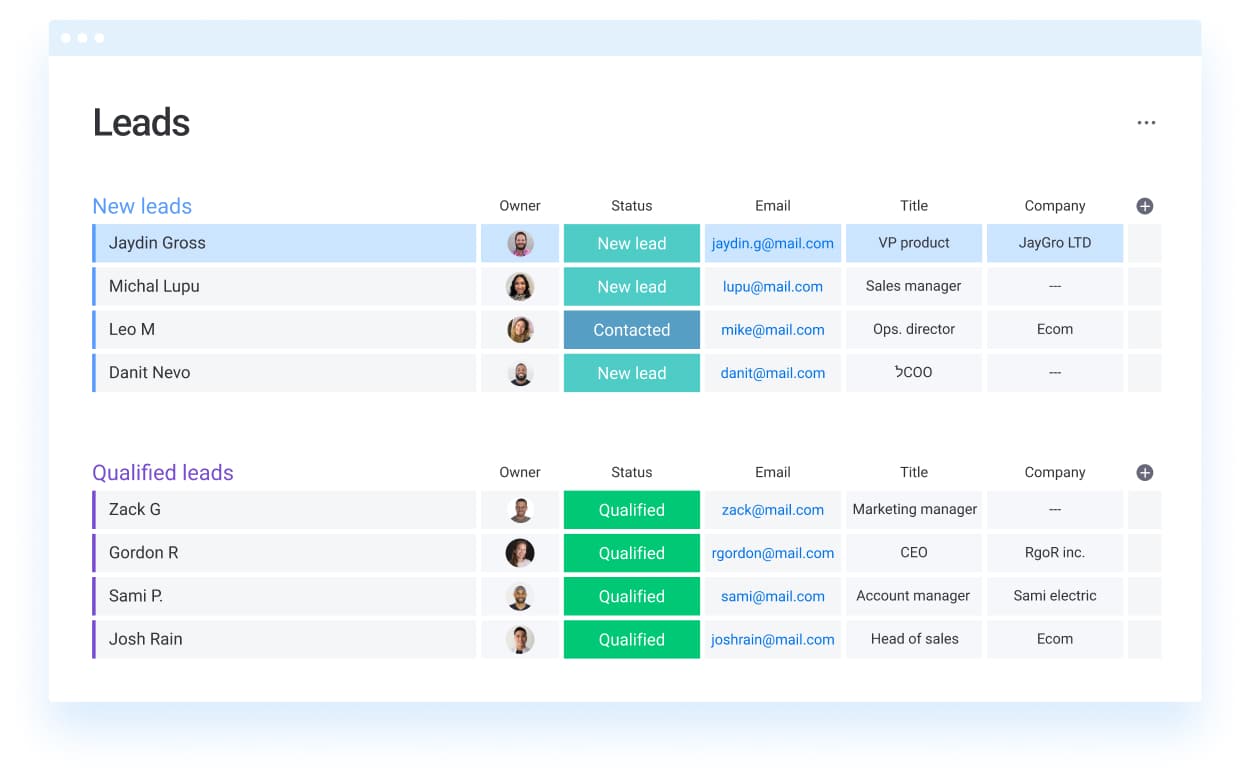
Powered by AI and automation, monday CRM is a visual and flexible customer relationship management platform built on the monday.com Work OS. Sales teams can use monday CRM to track leads, manage pipelines, and automate workflows without any coding or technical expertise. With an intuitive interface that users love and advanced customization capabilities, organizations can tailor monday CRM to fit any sales process.
Key features
- Sentiment analysis with AI: Get to the bottom of how your customers and leads really feel by analyzing sentiment through communication history
- Workflow automation: Automate repetitive tasks like follow-ups, lead assignments, and deal status updates to improve efficiency and reduce manual work
- AI assistance: Write personalized emails, summarize calls and meetings, and organize pipelines and tasks in an instant all with AI
How does monday CRM compare to Zoho CRM?
monday CRM offers a more user-friendly and visually appealing interface compared to Zoho CRM, making it easier for teams to navigate and customize their sales pipelines. On popular review site, G2, monday CRM users give it a 4.6/5, compared to Zoho CRM’s 4.1/5. Overall, users find monday CRM offers deeper integrations, better customization, and is easier to use than competitors.
monday CRM pricing
- Pricing starts at $12/seat/month
- Four plans available: Basic, Standard, Pro, and Enterprise
- 14-day free trial
Our in-depth comparison gives a better overview of Zoho CRM and monday CRM side-by-side
Try monday CRM2. Salesforce
Salesforce is a powerful CRM solution developed for businesses of all sizes, from startups to large enterprises. Salesforce is powered by AI, offering extensive automation features and smart workflows to speed up business processes. The software also offers tons of third-party integrations, making it ideal for teams that want to connect to a lot of different platforms.
Key features
- Einstein AI: Salesforce’s AI assistant helps sales teams with predictive analytics to identify high-value leads, trend forecasting, and real-time recommendations for reps
- Extensive automation: Automate lead assignments, approvals, and follow-ups with customizable workflows so that sales processes run smoothly
- Sales Cloud: Salesforce Sales Cloud helps teams grow and work more productively on sales processes with AI agents, AI sales data and analytics, and more
How does monday CRM compare to Zoho CRM?
Salesforce offers a more comprehensive and enterprise-ready CRM experience compared to Zoho CRM, with deeper AI capabilities and greater scalability. While Zoho CRM is a good choice for small and medium businesses, Salesforce is better equipped to handle complex sales processes as well as advanced reporting and automations, which is why it’s a better choice for larger organizations.
Salesforce pricing
- Starting price: $25/user/month
- Choose from five plans: Starter Suite, Pro Suite, Enterprise, Unlimited, and Einstein 1 Service
- 30-day free trial
3. Freshsales
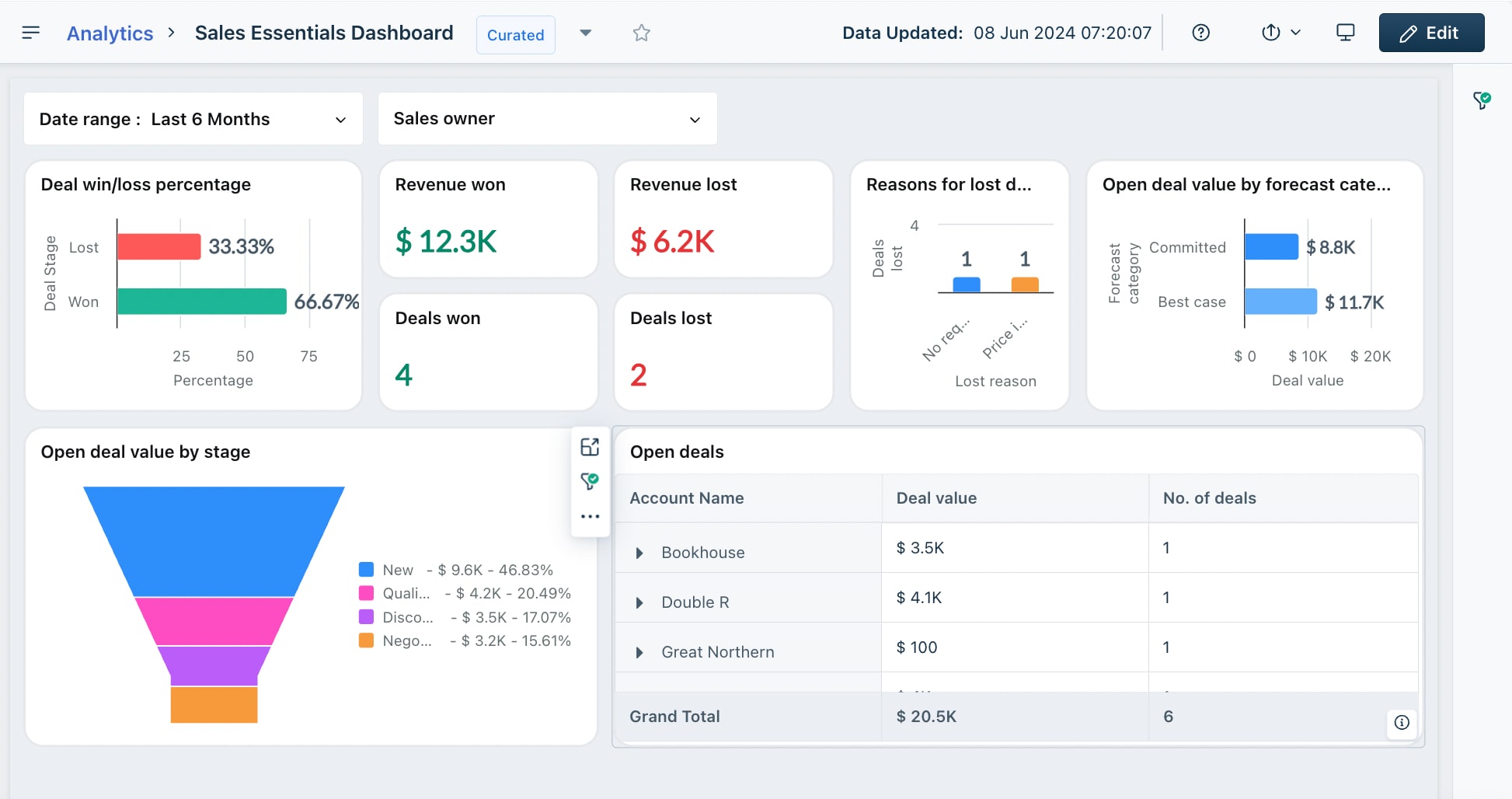
Freshsales, part of the Freshworks suite, is a sales-focused CRM that helps businesses streamline customer interactions with AI-driven automation and built-in communication tools. Freshsales provides a streamlined CRM experience for sales and marketing teams by integrating email, phone, and chat functionalities within a single platform.
Key features
- AI-powered lead scoring: Leverage AI to automatically prioritize leads and assign intent scores based on engagement levels and buying intent
- Freddy AI: Use Freddy AI assistant to work smarter with insights, lead management, deal recommendations, and even email writing
- Automated workflows: Create simple rule-based automations to trigger follow-ups, assign leads to the right reps, and update deal statuses
How does Freshsales compare to Zoho CRM?
Freshsales provides a slightly more intuitive and sales-oriented experience compared to Zoho CRM. Users on Freshsales’ G2 page give it a 4.5/5 and highlight its ease of use, which is another reason some prefer it over Zoho CRM. Additionally, users have overall better feedback for Freshsales support, making it a good choice for teams who want a bit more guidance in implementing their CRM.
Freshsales pricing
- Starting price: $9/user/month
- Choose from three plans: Growth, Pro, and Enterprise
- 21-day free trial
4. HubSpot CRM
HubSpot CRM offers free use of its platform with basic features, which is great for individuals or small teams who just want to dip their toes into new CRM software. Aside from the free plan, HubSpot CRM helps businesses align their sales, marketing, and customer service efforts in one place. With a user-friendly interface, automation, robust reporting tools, and AI-driven tools, HubSpot CRM is a great option for working more efficiently.
Key features
- Live chat: Connect with your clients and real-time website visitors to gather more potential customers and offer better customer experiences
- AI email writer: HubSpot CRM’s AI can help you generate and personalize sales outreach emails as well as templates for one-click responses
- Custom reporting: Track and analyze your performance of sales reps in real time to get valuable insights into your sales processes
How does HubSpot CRM compare to Zoho CRM?
HubSpot CRM isn’t alone in offering a free plan. Zoho CRM also offers a free plan for up to 3 users compared to just 2 users with HubSpot CRM. That said, HubSpot CRM stands out for offering more robust essential features at no cost compared to Zoho CRM’s limited free tier. Not only that, but HubSpot CRM and Sales Hub’s marketing tools make it a better option for businesses that want to align their sales and marketing efforts in a single, unified platform.
HubSpot CRM pricing
- Free forever plan
- Starting price: $15/user/month
- Multiple Sales Hub plans available for small businesses and enterprises
5. Pipedrive
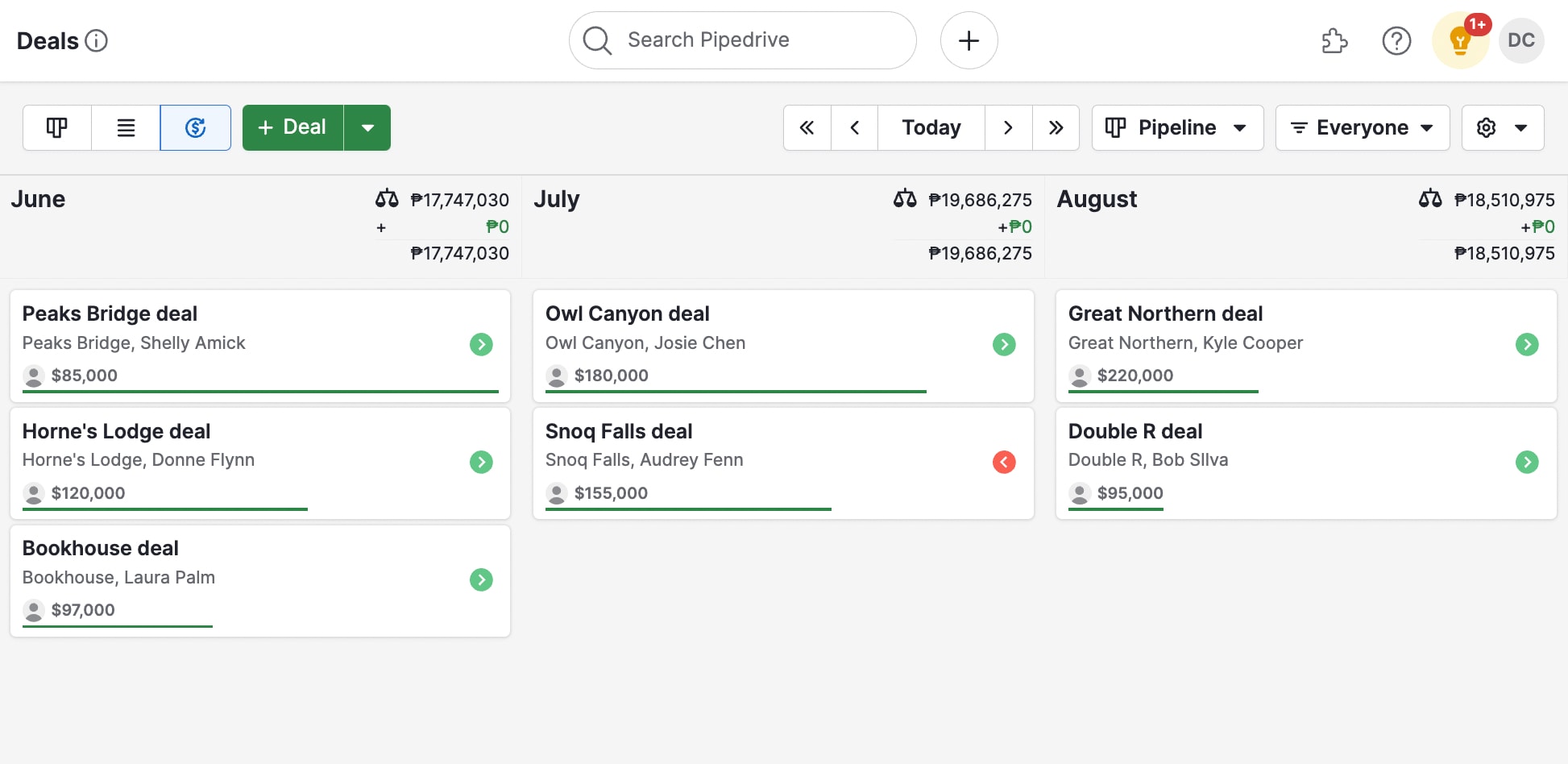
For teams who prioritize viewing their pipeline and processes to handle leads and deals, Pipedrive is a great option. This sales-focused CRM allows teams to manage deals, leads, and communication more efficiently with an easy drag-and-drop interface. Pipedrive streamlines sales processes by keeping pipelines organized so that leads don’t fall through the cracks.
Key features
- Pipedrive AI: Replace manual processes with AI to get deep insights, recommendations, and automate tasks to speed up workflows
- AI automation: Use AI to automate your entire sales cycle, from lead routing to follow-ups and communications
- Conversation syncing: Sync up to five email accounts as well as calendars, calls, and meeting links directly into Pipedrive
How does Pipedrive compare to Zoho CRM?
For businesses looking for a simple, sales-focused CRM, Pipedrive can be a good choice. It’s less complex than Zoho CRM and gives users a more streamlined experience with a strong emphasis on sales pipeline management and deal tracking. Teams can use the pipeline to close deals faster with minimal distractions.
Pipedrive pricing
- Starting price: $14/seat/month
- Choose from five plans: Essential, Advanced, Professional, Power, and Enterprise
- 14-day free trial
6. Insightly
Insightly is a CRM for small to mid-sized businesses, offering a blend of sales, project management, and marketing automation features. Insightly allows users to manage customer relationships as well as post-sale projects, making it a great choice for businesses who want to convert contacts into projects.
Key features
- AI features: Generate summaries of email communications and craft personalized replies with AI
- Process automation: Automate repetitive sales and operational task management to consistently nurture leads and reduce redundant work
- Performance insights: Get a look at your performance data in real-time to better understand sales cycles and leads
How does Insightly compare to Zoho CRM?
Insightly stands out with its built-in project management features and super simple interface. Insightly can feel less robust than Zoho CRM, but for some businesses, a light and simple CRM makes more sense. For less ‘techy’ teams, Insightly can be a good CRM solution that still provides essential sales and lead management tools without feeling overwhelming.
Insightly pricing
- Starting price: $29/user/month
- Choose from three plans: Plus, Professional, and Enterprise
- 14-day free trial
7. Bitrix24
Bitrix24 is an all-in-one business management platform that includes CRM, project management, e-commerce, and collaboration tools. Designed for teams that need more than just sales tracking, Bitrix24 provides a comprehensive suite of features to optimize business operations while centralizing customer data.
Key features
- CoPilot AI assistant: Bitrix24 includes a free AI-powered sales assistant to generate text, transcribe calls, score new leads, and forecast sales
- Omnichannel contact center: Client messages from web forms, emails, chats, social media, and other channels all appear in a unified contact center
- Sales automation: Automate client notification texts and emails, workflows to trigger deal changes in the pipeline, and sales reps updates based on deal status
How does Bitrix24 compare to Zoho CRM?
For teams that want to combine their CRM with a broader range of tools for marketing, project management, and e-commerce, Bitrix24 is a good choice. Teams can use the platform for HR management, building and monetizing a website, and collaboration, making it a more comprehensive solution for companies that need a unified workspace.
Bitrix24 pricing
- Free forever plan with unlimited users
- Starting price: $49/organization/month
- Choose from five plans: Free, Basic, Standard, Professional, and Enterprise
- 15-day free trial for higher-tier plans
monday CRM: The Zoho CRM alternative that will boost your sales
There is no shortage of Zoho CRM alternatives, the trick is picking the one that will grow with your business for years to come. Flexible solutions like monday CRM offer enough customization, integration, and automation features to really fit your team’s processes like a glove, giving you a platform that’s tailored to your needs.

monday CRM users love its user-friendly interface, which relies on drag-and-drop functionality to make it easy to customize boards, pipelines, and contacts just how you want them. Additionally, the advanced AI features help your team bypass redundant manual tasks and focus on more strategic and profit-generating tasks, like selling, nurturing relationships, and building better marketing campaigns.
Aside from the features we covered earlier, here’s a quick look at some other great monday CRM functionalities:
- Instantly generate data on incoming leads summaries, company details, and suggested discovery questions with the built-in AI assistant
- Use AI to extract the most important data from PDFs to get to the core of what matters in case studies, summaries, or contracts
- Route new leads to the right agent with AI to speed up the allocation process

- Create personalized sales sequences using AI to better engage every customer at all stages of your pipeline
- View customizable dashboards with real-time data like deal stages, performance metrics, and your sales funnel for quick decision-making
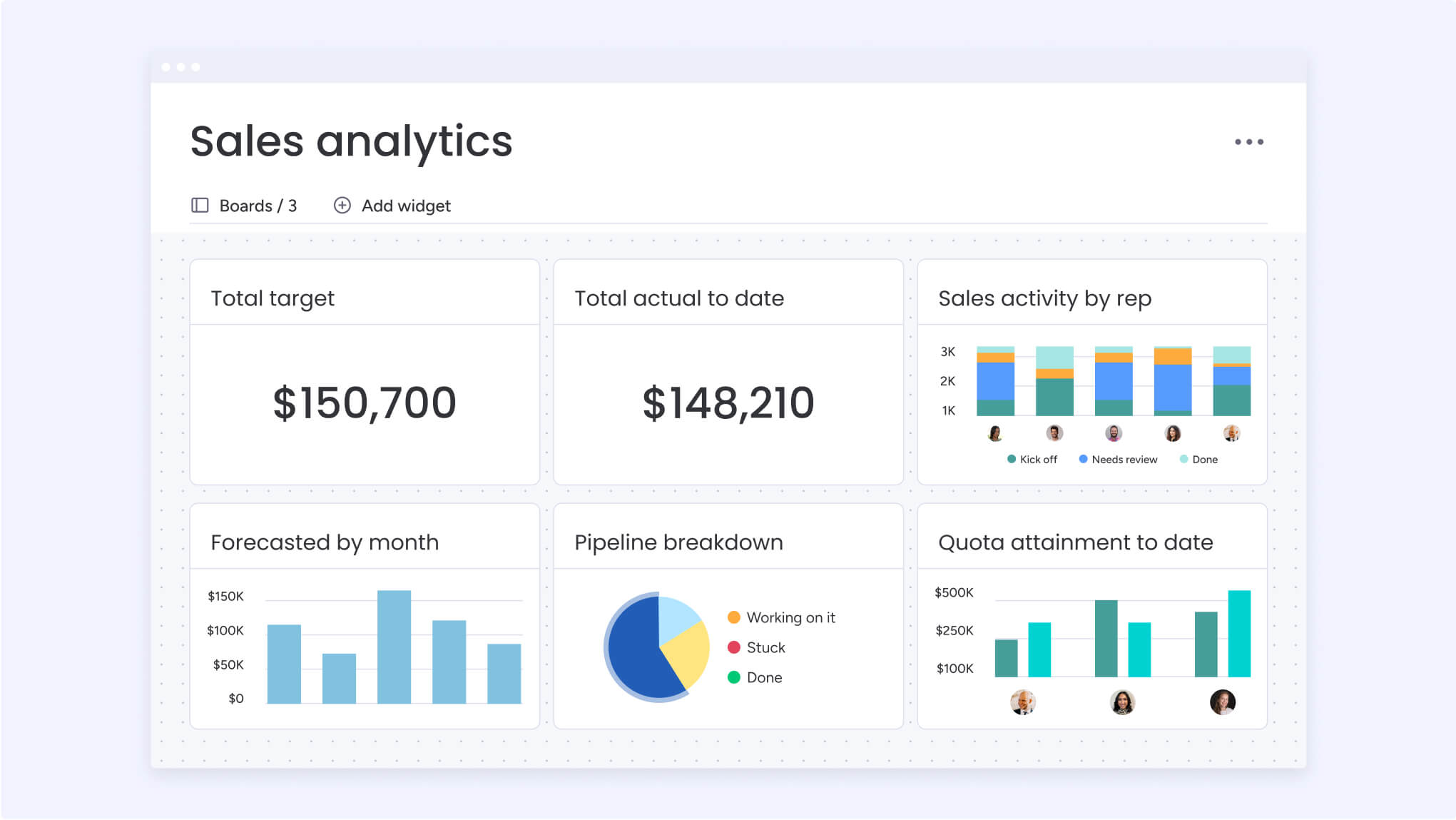
- Build accurate forecasts based on your current pipeline to predict future profits and intervene in at-risk deals
- Integrate over 500 different work tools like Zoom, Gmail, DocuSign, and hundreds of others for smooth data syncing
- Customize your deal procedures just by dragging and dropping columns or editing stages for the visuals that work best for you
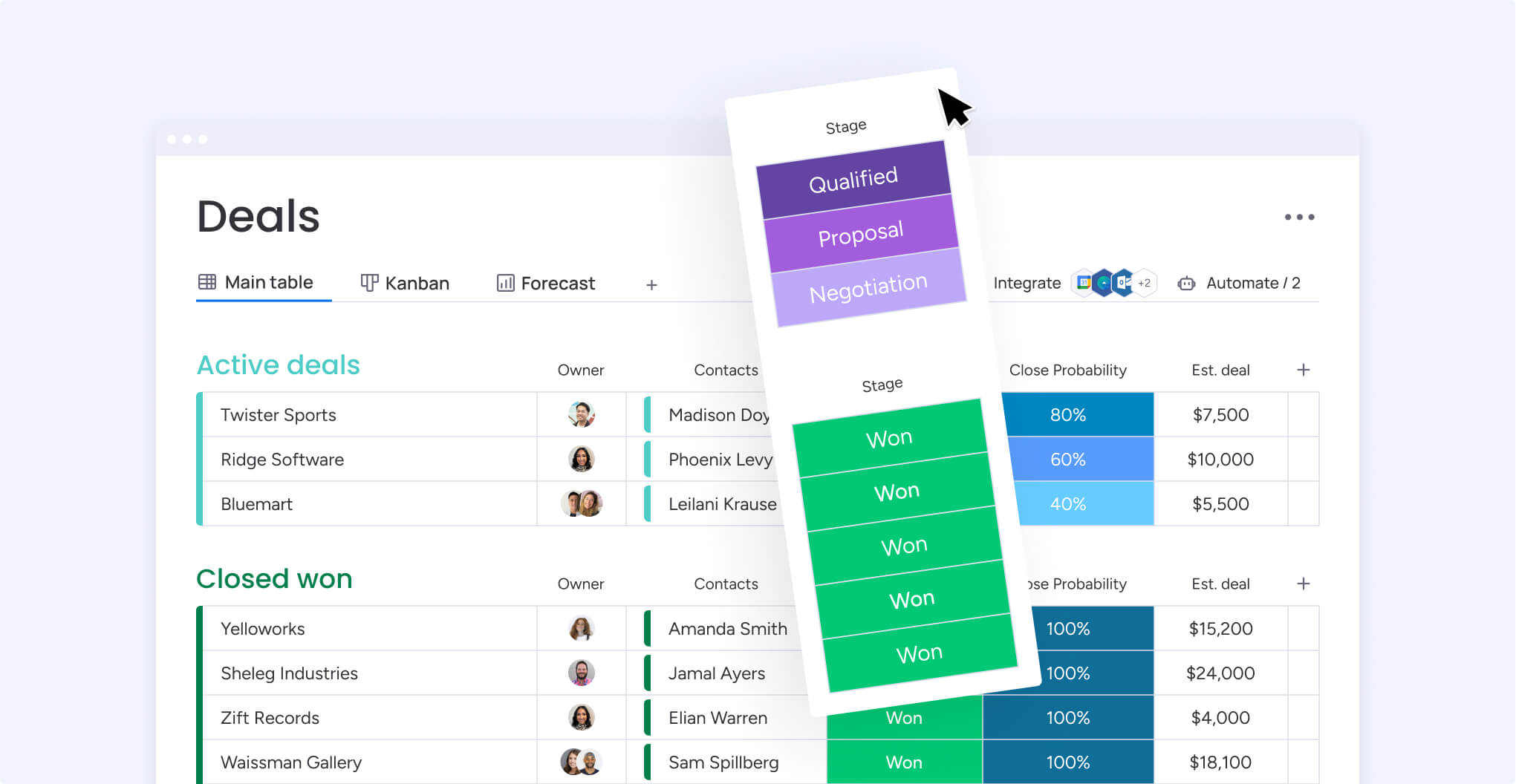
- Advanced email analytics allow you to see who opened your messages, clicked links, and more
- Capture leads by integrating work tools or by creating your own web forms directly from your CRM
6 easy steps to migrate from Zoho CRM to monday CRM
It may seem like a headache to move from one platform to another when you’re already settled, but migrating to a new CRM when you’ve outgrown your last one will significantly benefit your team in the long run. With the right planning and some patience, migrating from Zoho CRM, or any other CRM solution, to monday CRM doesn’t need to be complicated. Here’s what it looks like in a few brief steps:
- Export your data from Zoho CRM: First, start by sorting and downloading data like contacts, leads, deals, and custom fields as CSV files
- Clean and format your data: Remove duplicates, correct formatting issues, and make sure field names align with monday CRM
- Set up your monday CRM workspace: Before importing your data from Zoho CRM, first create boards, pipelines, integrations, and automations to match your processes
- Import data into monday CRM: Import your data from your CSV files and map fields correctly to avoid errors
- Organize imported data: In case data doesn’t match up 100%, you want to check for missing information, adjust settings, and categorize data before going live
- Train your team and run tests: Provide team training on monday CRM’s features and run tests on processes like automations, incoming leads, and integrations
Another core benefit of migrating from Zoho CRM to monday CRM is that the platform is so much more than just a CRM. As part of the monday.com ecosystem, users can rely on one platform to handle projects, development projects, and deliver exceptional customer service.
monday CRM seamlessly connects data across its products, so you can start new projects based on deals or open tickets to resolve customer issues all from one CRM. With one AI-powered platform to handle all your operations, your team can work more productively and optimize every single customer interaction.
FAQs
What are the disadvantages of Zoho CRM?
Zoho CRM can be complex for new users, with a steep learning curve due to its extensive features and customization options. Additionally, some users report slower customer support response times.
Who are Zoho’s main competitors?
Zoho CRM’s main competitors include software like monday CRM, Salesforce, HubSpot CRM, and others. These platforms offer similar sales and automation features, with different pricing options and varying focuses on usability, scalability, and integrations.
Is Zoho CRM really free?
Yes, Zoho CRM offers a completely free plan, but it is limited to three users and includes only basic features. Free doesn’t always equal value, and businesses that need advanced automation, detailed analytics, or more integrations will be better off with a higher-tiered plan for full functionality.

